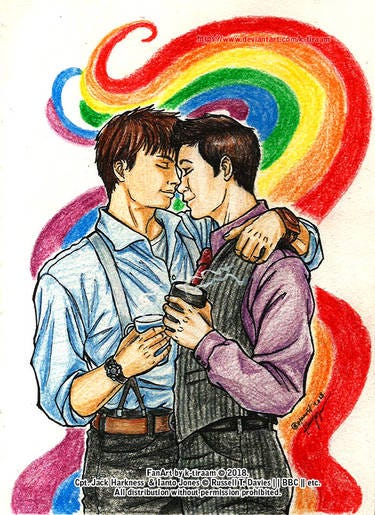The Amazingly Consistent Queer Representation in Doctor Who
The show has always included queer characters, both openly and indirectly.
Doctor Who has been a well-loved Sci-fi show for 60 years in over 200 countries. It began in 1963 and since then there have been 15 officially numbered Doctors who regenerate into new forms every few seasons. In terms of television, it can be said that Doctor Who has always been ahead of its time in terms of queer representation. Although many of the characters have only been canonically queer, in more recent years the writers and showrunners have made more of an effort to make LGBTQ+ characters abundantly clear. This is evident in the 60th anniversary specials that sees the return of David Tennant and Catherine Tate and the addition of a trans character, Rose Noble, played by trans actress, Yasmin Finney.
One of the first scenes in Star Beast shows Rose Noble being dead named by transphobes and a discussion about her transition follows. This is a clear representation of the trans community, showing the abuse trans people often suffer after coming out, resonating with many people all around the world. LGBTQ+ people do not often get the accurate representation they deserve within television and Doctor Who has always blazed a path for it, whether obviously or subtly.
The values of the show have remained largely the same since 1963 but the queer representation has only grown. Russell T. Davies brought a new sparkle of queerness alongside the same old Doctor, with nods to the Doctor’s fluid sexuality and gender identity and openly gay characters like Captain Jack Harkness. Jack is generally a flirtatious character but is seen to be flirting with both men and women throughout the episodes. He also engages in a relationship with Ianto Jones in Torchwood (spin-off) and the two actors performed a kiss scene. In 2005, at the time of production, a kiss scene between two men was monumental for TV as it was the same year the first civil partnership took place in the UK and it represented the changing societal attitudes in the UK.
Fan art of Jack Harkness and Ianto Jones
For fans, Doctor Who has become a safe space and a comfort show, demonstrating that you can be an all-powerful time lord or a brave companion and still be completely yourself. When I asked my queer friends, who are long time fans of the show, if they felt more interpreted by the LGBTQ+ characters, they said they felt the representation had always been great and by including it more often, queer characters will hopefully become more normalised. Another friend remarked that it was interesting to see years of subtly solidify into fully fleshed out gay and trans roles. Doctor Who continues to be a beacon of light shining representation into what can be a bleak and scary world.




